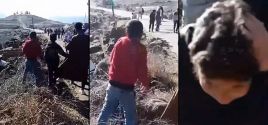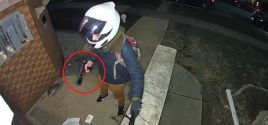U.S. attorney's firing may be connected to CIA corruption probeBy Margaret Talev and Marisa TaylorMcClatchy Newspapers Mar. 20, 2007 |
Popular 
Putin Accuses 'Ethnic Jews' of Tearing Russian Orthodox Church Apart

IDF Opens Fire on Syrians Protesting Israel's Expanding Occupation of South Syria

Saudi National Rams Car Into Germans at Christmas Market in Suspected Terrorist Attack [UPDATED 2X]

Ohio Senate Passes Bill Aimed at Outlawing Criticism of Israel, Criminalizing Gospel

Nick Fuentes Targeted by Gunman at His Home After Being Doxed on Elon Musk's Twitter [UPDATED]
 WASHINGTON - Fired San Diego U.S. attorney Carol Lam notified the Justice Department that she intended to execute search warrants on a high-ranking CIA official as part of a corruption probe the day before a Justice Department official sent an e-mail that said Lam needed to be fired, U.S. Sen. Dianne Feinstein said Sunday. Feinstein, D-Calif., said the timing of the e-mail suggested that Lam's dismissal may have been connected to the corruption probe. Justice Department spokesman Brian Roehrkasse denied in an e-mail that there was any link. "We have stated numerous times that no U.S. attorney was removed to retaliate against or inappropriately interfere with any public corruption investigation or prosecution," he wrote. "This remains the case and there is no evidence that indicates otherwise." But the revelation is sure to heighten demands in Congress for a full investigation into whether something other than job performance was behind the Justice Department's dismissals late last year of eight U.S. attorneys, including Lam. On Sunday, Senate Judiciary Committee Chairman Patrick Leahy, D-Vt., said he intends to force President Bush's top political adviser, Karl Rove, to testify and will insist that the testimony be under oath. Leahy, who appeared on ABC's "This Week," said he is "sick and tired" of the administration's changing rationale for the firings. Justice Department officials originally told Congress that the U.S. attorneys had been dismissed for poor performance. But since it's become known that most of the attorneys received positive job evaluations. Last week, the Justice Department released e-mails showing that loyalty to President Bush and Attorney General Alberto Gonzales was among the criteria used to judge U.S. attorneys' performance and that Rove and former White House counsel Harriet Miers were deeply involved in discussions leading up to the dismissals. Roehrkasse said the Justice Department would provide additional e-mails to Congress on Monday. The documents were to have been surrendered last week, but Justice officials delayed the delivery, saying they needed more time to prepare them. In an appearance on CBS' "Face the Nation," Feinstein said she'd not yet decided what motivated Lam's dismissal. "There were clearly U.S. attorneys that were thorns in the side for one reason or another of the Justice Department," Feinstein said. "The attorney general has said he did not know what was going on ... that is very difficult for me to believe." Feinstein said Lam notified the Justice Department on May 10, 2006, that she planned to serve search warrants on Kyle Dustin "Dusty" Foggo, who'd resigned two days earlier as the No. 3 official at the CIA. On May 11, 2006, Kyle Sampson, then Gonzales' chief of staff, sent an e-mail to deputy White House counsel William Kelley, asking Kelley to call to discuss "the real problem we have right now with Carol Lam that leads me to conclude that we should have someone ready to be nominated on 11/18, the day her 4-year term expires." The e-mail did not spell out what the "real problem" was, and it was unclear whether Kelley and Sampson talked later. Until now, lawmakers have focused on two of Lam's other inquiries into Republicans as possible ways in which she may have chafed the administration. Lam oversaw the investigation that led to the corruption conviction of then-Rep. Randy "Duke" Cunningham, R-Calif., who pleaded guilty in late 2005 to accepting $2.4 million in bribes. He was sentenced in March 2006 to eight years and four months in prison. On the same day last year as the Sampson e-mail, the Los Angeles Times reported that the Cunningham probe was being expanded to look at the actions of another California Republican, then-House Appropriations Committee Chairman Jerry Lewis. Feinstein did not say how she learned that Lam had notified the Justice Department about her plans to serve search warrants on Foggo, who on May 8 had resigned as the executive director of the CIA. FBI agents seized records from Foggo's CIA offices and his suburban Vienna, Va., home on May 12. Who Lam notified about her plans was unknown. Ordinarily, information about search warrants in high-profile cases would be passed to the U.S. attorney executive office in Washington. At the time, that office was headed by Michael Battle. Battle, who notified the dismissed U.S. attorneys they were being replaced in December, resigned March 5. Sampson, who resigned last week, declined comment through his lawyer. Feinstein's office also declined interview requests. Sampson's May 11 e-mail was released as part of a congressional investigation into the firings last year of Lam and seven other U.S. attorneys, and the Bush administration's changing explanations as to what role politics or performance played. Democrats say they will investigate whether independent prosecutors were forced out for going after Republican corruption or ignoring pressure to prosecute Democrats in order to sway elections and are expected to seek testimony from Sampson and Kelley as well as Rove and Miers. The White House is scheduled to tell Congress on Tuesday whether it will allow the testimony or invoke executive privilege. Also this week, the House and Senate are scheduled to vote to undo a law quietly passed last year that stripped the Senate's power to reject interim U.S. attorneys the administration might pick to replace ousted prosecutors. Meanwhile, the controversy over the firings dominated the Sunday morning political talk shows as lawmakers geared up for more developments in the week ahead. Sen. Charles Schumer, D-N.Y., predicted on NBC's "Meet the Press" that Gonzales would be forced from his job within a week. Schumer also proposed a short list of three Republican replacements. Sen. Arlen Specter, R-Pa., the top Republican on the panel, said Congress should consider writing legislation to require the Justice Department to show cause if the administration wants to remove one of its U.S. attorneys. "Congress has the constitutional authority to set some parameters and guidelines," Specter said on "Fox News Sunday." "We don't really want to interfere with the president's basic right to set policy. If he wants immigration cases emphasized, his U.S. attorneys ought to do that. Whatever classifications he wants ought to be followed. But we're learning from this experience. If we find there's a way to better regulate this kind of a situation, Congress ought to act." The three lawyers Schumer suggested Democrats might support to replace Gonzales are: -Michael B. Mukasey, who returned last year to the private sector after serving as chief U.S. district court judge of the southern district of New York. Mukasey, a Reagan administration nominee, presided over the terrorism trial of Sheik Omar Abdel Rahman and 11 co-defendants. -Larry Thompson, left the Justice Department in 2003 after serving as deputy attorney general under John Ashcroft. Thompson focused on terrorism and corporate crime, including a role in going after Enron Corp. -James Comey, left the Justice Department in 2005 after serving as Thompson's replacement. Comey is trusted by some Democrats because of his perceived discomfort with some of the administration's terrorism surveillance policies and because he named U.S. Attorney Patrick Fitzgerald as special prosecutor in the CIA leak case that ended with the conviction of Vice President Dick Cheney's former chief of staff, I. Lewis "Scooter" Libby. |



